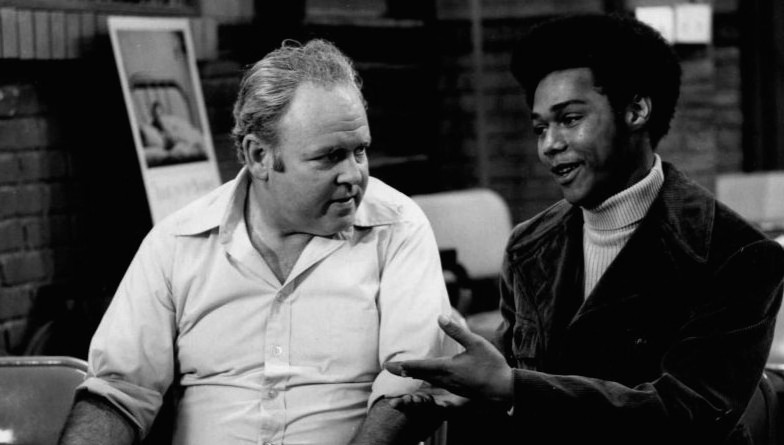The early 1970s was a time of transition, as America experienced the aftershocks of the Kennedy assassination, the Vietnam War, the civil rights movement, and the sexual revolution.
Jewish comedy writers responded in different ways to the upheavals. Older writers who had come of age in World War II tended to focus their sitcoms and films on the ills of society; some of the leading younger writers responded by pushing the boundaries of acceptable humor to the limits.
As was the case in previous generations, many of the new comedy writers were Jewish. However, as the social climate of the country changed, allowing for greater openness and tolerance, the new crop of Jewish comedy writers viewed their Jewishness not as restraining, but empowering. As a result, they helped create a Jewishly informed but uniquely American comedic genre.
‘Nam and Neuroses
“…The priest [says] to the rabbi, ‘Why don’t you ever eat ham?’ and the rabbi says, ‘It’s against my religion. Why don’t you ever go out with a girl?’ and the priest says, ‘It’s against my religion,’ and the rabbi says, ‘You oughta try it, it’s better than ham.'” –Archie Bunker (Carroll O’Connor), All In The Family
Foremost among the socially conscious sitcoms of the Vietnam era was All In The Family (1971-79). Overseen by Jewish writers, including Rob Reiner, creator Norman Lear, and Mel Tolkin, the show exposed the idiocy of bigotry by poking fun at its narrow-minded protagonist Archie Bunker (Carroll O’Connor), who frequently clashed with his liberal son-in-law Mike Stivic (Rob Reiner, son of Jewish television pioneer Carl Reiner).

Help us keep Jewish knowledge accessible to millions of people around the world.
Your donation to My Jewish Learning fuels endless journeys of Jewish discovery. With your help, My Jewish Learning can continue to provide nonstop opportunities for learning, connection and growth.
In the classic episode, “Stretch Cunningham, Goodbye” (co-written by veteran Jewish humorist Milt Josefsberg), Archie is forced to come to terms with his anti-Semitism after agreeing to deliver a eulogy for his pal Stretch (a.k.a. Jerome), only to discover that his longtime co-worker at the loading dock was Jewish. At the synagogue, Archie reluctantly dons a yarmulke, saying, “I wish I knew he was Jewish because there was an awful lot of remarks and jokes passed around… not by me–some of the other guys…. Not that Stretch felt bad….. I just wish, while you was here, I coulda made you laugh more, Stretch…. Jerome… Shalom.”
Later in the series, Archie is once again forced to confront his prejudice against Jews when he adopts his Jewish niece, Stephanie (Danielle Brisebois). After Stephanie tries to conceal the fact that she’s Jewish, an uncharacteristically introspective Archie realizes with regret that some of his comments about Jews have diminished Stephanie’s self-esteem. As a result, he gives her a necklace adorned with a Star of David, saying, “You gotta love somebody to give them one of these. I mean, you gotta love everything about them.”
Lampooning the Nation
National Lampoon, the humor magazine created in 1970 by Harvard grads Rob Hoffman (Jewish) and Henry Beard and Doug Kenney (not Jewish), set a new standard for irreverence typified by sarcasm and ironic detachment. The trio had formerly worked on their alma mater’s humor magazine, The Harvard Lampoon, developing what would come to be known as the “Harvard style” of comedy writing–a style characterized by its shock value.
Unlike comedic institutions of years past, such as the predominantly Jewish Your Show of Shows and MAD magazine, National Lampoon was staffed primarily by non-Jews.
“Comedy writing changed in the ’70s,” explains writer/performer Robert Smigel (Saturday Night Live, Late Night With Conan O’Brien). “It wasn’t as Jewish-dominated. Comedy became more ironic and detached; there was the huge influence of the Harvard-type of comedy writing.”
Still, as Lampoon cartoonist Drew Friedman observes, “Lampoon took off from what Lenny Bruce was doing. That’s the Jewish connection. Lenny Bruce wanted to go further than anyone else had gone in the world of comedy, and Lampoon took that; they wanted to go further as well. And they did.”
For all the non-Jewish “Harvard-types” associated with Lampoon, a handful of Jewish writers achieved prominence in the magazine. Paul Krassner (The Realist) wrote “The Unforgiving Minute,” a column which satirized trends of the day. Jewish writer Gerry Sussman (Playboy) created the recurring Lampoon feature “My Meter Is Running,” about a foulmouthed Jewish cabbie named “Bernie X” who commented on New York City’s mores from a distinctly paranoid perspective.
In one of Bernie’s earliest appearances, “The Goyspiel According To Bernie” (December 1974), Bernie’s passenger is a fellow Jew on his way to the National Conference of Christians and Jews. Bernie immediately launches into a tirade, accusing the Christians attending the conference of plotting to blackmail its rabbinic members with incriminating photos. Bernie’s theory: “The gist of the plan is to destroy the rabbis’ reputations…Then, with all our top rabbis in disgrace, [the Christians] are going to walk in and feed the kids a line of propaganda and convert them all to gentiles.”
Bernie’s outbursts were not meant to be taken literally. Sussman’s character embodied Judaism’s notion of the yetzer ha-ra (the evil inclination); his racist ravings served both as a mirror and a warning to readers not to indulge in their own evil inclinations. “Bernie X” influenced a number of contemporary Jewish “shock comics,” among them Andrew “Dice” Clay and Howard Stern.
Caesar’s Auteurs
“Two elderly women are at a Catskill Mountain resort, and one of them says, ‘Boy, the food at this place is really terrible!’ And the other one says, ‘Yeah, I know. And such small portions!'” –Alvy Singer (Woody Allen), Annie Hall (1977)
Still another comedy trend of the ’70s was the catapulting of Sid Caesar writers Mel Brooks (Blazing Saddles, 1974), Woody Allen (Annie Hall, 1977), and Carl Reiner and Larry Gelbart (Oh, God!, 1977) to movie stardom.
With his landmark film Blazing Saddles, a slapstick farce with a serious agenda–prejudice and racism–Mel Brooks achieved his first box-office success. The film, co-written with African American comedian Richard Pryor and Andrew Bergman, Norman Steinberg, and Alan Uger (all Jewish), tells the tale of the new Black sheriff, Bart (Cleavon Little), and his white dipsomaniac sidekick, Jim, a.k.a. The Waco Kid (Gene Wilder), in an all-white town.
At first, the townsfolk are horrified by Little; eventually they rally around him and band together to fight a force of KKK, Nazis, Arabs, and other outlaws. The film’s subtext is a clarion call for a new age of racial, religious, and ethnic harmony against the backdrop of real-life riots and civil unrest in America.
One of the most memorable scenes depicts a Sioux chief (Mel Brooks) drawing his horse up to a black family during an Indian raid on a wagon train and saying in Yiddish: “Zeit nisht meshugge. Loz em gaien… Abee gezint” –“Don’t be crazy. Let them go… As long as we are all healthy.” No translation was provided, but audiences generally understood Brooks’ linking Indians, blacks, and Jews as historic underdogs who could use a helping hand in a cruel and hostile world.
Woody Allen’s multiple Oscar-winning film Annie Hall, a comic exploration of interfaith romance in the ’70s, chronicles the exploits of Alvy Singer (Woody Allen), a neurotic standup comic who attempts to sustain a relationship with his equally neurotic non-Jewish girlfriend Annie Hall (Diane Keaton).
Alvy is hypersensitive, even paranoid, about his Jewishness and he perceives anti-Semitism everywhere. In one scene, Alvy dines with Annie’s WASPy family, including her anti-Semitic grandmother. Feeling acutely self-conscious, he imagines himself as he thinks “Grammy Hall” must see him: a Jew with a beard, black hat, and peyoss [side locks]. Alvy’s excruciating ambivalence as a Jew trying to fit into America epitomizes a conflict faced by many Jews coming of age in the 1970s, before it was “in” to be overtly Jewish.
A Slob Scorned
“We’re in trouble. I just checked with the guys at the Jewish house and they said that every one of our answers on the Psych test was wrong.” –Robert Hoover (James Widdoes), Animal House
Meanwhile, the National Lampoon alumni and friends focused on primal revenge. Their raunchy, teen-oriented 1978 comedy hit National Lampoon’s Animal House featured Tom Hulce as Larry “Pinto” Kroger, a freshman at the fictitious Faber College.
Shunned by the WASPy Omega fraternity, Larry conspires with fellow outcasts in the lowly Delta frat to lay siege to Omega House. It is no coincidence that the film–co-written, produced, and directed by Jews–would array a band of shunned outcasts against the entrenched establishment. An early scene foreshadows the inevitable confrontation. As Larry and his roommate Kent “Flounder” Dorfman (Stephen Furst) are escorted into Omega House during pledge week, it’s all too obvious that our gawky hero and his pudgy pal have nary a chance of fitting in with the blonde, blue-eyed, upper-class specimens who populate Omega House.
Omega membership chair Douglas C. Neidermeyer (Mark Metcalf), a neo-fascist army brat, puts the two candidates “in their place”:
Neidermeyer: “I’d like you to meet Mohammed, Jugdish, Sidney and Clayton…”
(Neidermeyer points toward a row of students off to the side: a black Muslim student, a Middle Eastern student, a Jewish student, and a blind student in a wheelchair.)
Neidermeyer: “Now, just grab a seat, and don’t be shy about helping yourselves to punch and cookies.” (playfully hits Kent in stomach)
The film’s non-Jewish co-writers Doug Kenney and Chris Miller created a scathing portrayal of Harvard-style WASPs. They knew firsthand what it was like to be in the company of elite snobs; indeed, the script is based in part on Miller’s own experiences in the Ivy League world. At its core, National Lampoon’s Animal House, like Blazing Saddles, delivered the message that all outsiders in the social hierarchy (in this case, nerds, intellectuals, and rebels) need to stick together against the cold-hearted establishment.
Adapted with permission from Reform Judaism magazine.



